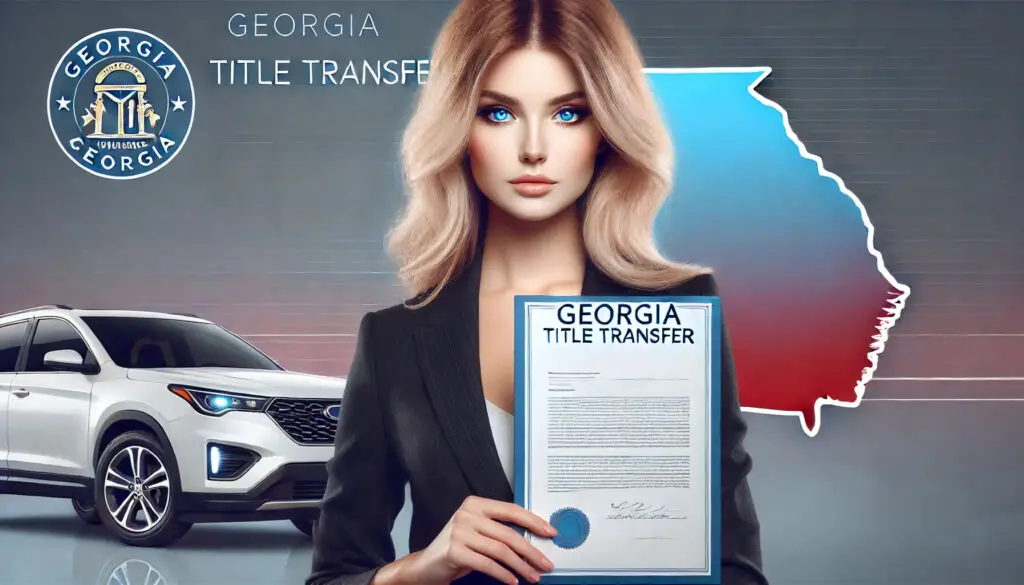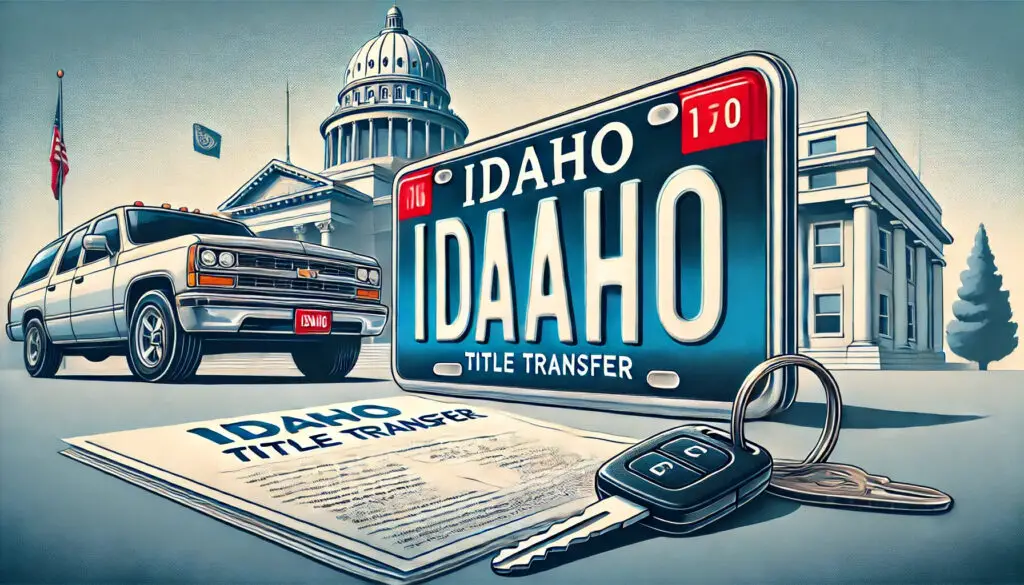Transferring a vehicle title in Illinois is a crucial step when changing ownership of a vehicle, whether you’re buying, selling, gifting, or inheriting. Understanding the process thoroughly ensures that the transfer is completed correctly, avoiding potential delays or legal issues. This guide covers every step of the Illinois vehicle title transfer process, the necessary documents, fees, common mistakes to avoid, and answers to frequently asked questions.
What is a Title Transfer in Illinois?
A title transfer is the official process that changes the ownership of a vehicle from one party to another. In Illinois, this process is managed by the Illinois Secretary of State’s office. The transfer involves several key components, including the submission of paperwork, payment of fees, and the correct handling of legal documents to ensure that the new owner has full rights to the vehicle.
When is Title Transfer Required in Illinois?
In Illinois, a title transfer is required under the following circumstances:
- Selling a Vehicle: When a seller transfers ownership to a new buyer.
- Purchasing a Vehicle: When a buyer acquires a vehicle from a dealership or private seller.
- Gifting a Vehicle: When a vehicle is transferred as a gift between individuals.
- Inheriting a Vehicle: When a vehicle is passed down through inheritance.
Each scenario comes with specific steps and requirements, which are detailed below.
Roles and Responsibilities in the Title Transfer Process
Buyer’s Responsibilities
As the buyer, it’s your responsibility to:
- Ensure the vehicle title is signed by the seller.
- Complete the Application for Vehicle Transaction (VSD 190) form.
- Provide a valid proof of identity (e.g., driver’s license).
- Pay the applicable title transfer fees and taxes.
Seller’s Responsibilities
As the seller, you need to:
- Provide the original vehicle title.
- Sign the title and provide any necessary disclosures, such as an odometer reading.
- Complete any forms required for the transaction, including the Odometer Disclosure Statement (for vehicles under 10 years old).
Required Documents for Title Transfer in Illinois
To successfully transfer a vehicle title in Illinois, the following documents are required:
- Original Vehicle Title: The current title of the vehicle.
- Completed VSD 190 Form: This form is used for the majority of vehicle transactions.
- Bill of Sale: A receipt that proves the transaction between the buyer and seller.
- Odometer Disclosure Statement: Required for vehicles that are less than 10 years old to confirm the mileage.
- Proof of Identity: A valid government-issued ID such as a driver’s license or passport.
- Payment for Fees and Taxes: Transfer fees and sales tax must be paid at the time of submission.
Step-by-Step Process for Transferring a Title in Illinois
1. Obtain the Original Title
The seller must provide the original title to the buyer. The title must be signed and dated by the seller, confirming the transfer of ownership.
2. Complete the Title Transfer Forms
The buyer is responsible for completing the VSD 190 form. This form is used to report the transaction and initiate the transfer with the Illinois Secretary of State.
3. Submit the Documents
Submit the signed title, VSD 190 form, proof of identity, bill of sale, and any other required documents either in person at a local Secretary of State office or by mail.
4. Pay Applicable Fees and Taxes
Pay the required fees for the title transfer, which may include a title fee and sales tax. Payment can be made by check, credit card, or cash, depending on how the transaction is handled.
5. Receive Your New Title
Once the documents are processed, the new title will be issued in the buyer’s name. This typically takes 2-4 weeks, though processing times may vary.
Can You Transfer a Title Online in Illinois?
Yes, some title transfers can be done online. However, online title transfers have specific requirements, including:
- The vehicle must have a clear title (i.e., no outstanding liens).
- Both the buyer and seller must meet certain eligibility criteria.
- Only certain types of vehicles are eligible for online transfers, and the process may be restricted to specific circumstances such as private party sales.
Transferring a Title for a Financed Vehicle
If the vehicle has a lien (i.e., it’s still being financed), the process is slightly different:
- Pay off the loan: Ensure that the loan is fully paid off before attempting the title transfer.
- Obtain a Lien Release: The lender must provide a lien release, which confirms that the debt has been cleared.
- Complete the Title Transfer: Once the lien release is received, you can proceed with the normal title transfer process.
Transferring an Out-of-State Title in Illinois
If you are transferring a title for a vehicle purchased in another state, you will need to:
- Submit the original title from the other state.
- Ensure that the vehicle identification number (VIN) on the title matches the VIN on the vehicle.
- Provide proof of identity and other required documents.
- Pay any applicable fees or taxes.
Title Transfer for a Deceased Person’s Vehicle
When inheriting a vehicle, the following documents are typically required:
- Death Certificate: To prove the death of the vehicle owner.
- Will or Legal Documents: Proof of inheritance or transfer of ownership.
- Completed Title Transfer Form: The VSD 190 form must be completed as part of the inheritance process.
Special Considerations
- If the vehicle is jointly owned, both owners must sign the title and complete the transfer.
- If there is an outstanding loan, the lien must be satisfied before the transfer can occur.
Fees and Costs Involved in Title Transfer
The fees for transferring a title in Illinois can vary depending on several factors, including the type of vehicle, its age, and whether there are any liens. Common fees include:
- Title Fee: Typically ranges from $150 to $250, depending on the vehicle.
- Sales Tax: Based on the purchase price of the vehicle, or a fair market value if the vehicle is a gift or inheritance.
- Late Fees: If the title transfer is not completed within a certain time frame, late fees may apply.
Common Mistakes to Avoid During Title Transfer
To ensure a smooth title transfer, avoid the following mistakes:
- Missing Signatures: Both the buyer and seller must sign the title in the appropriate places.
- Incomplete Forms: Ensure that all necessary forms, such as the VSD 190, are filled out completely.
- Incorrect Vehicle Information: Double-check that the vehicle’s VIN, make, model, and other details match the title and documents.
How Long Does the Title Transfer Process Take?
The title transfer process in Illinois typically takes 2-4 weeks after submission. However, delays can occur due to missing documentation or errors in the paperwork. It is essential to submit everything correctly to avoid delays.
Frequently Asked Questions (FAQs)
1. What is the cost of transferring a title in Illinois?
The cost typically ranges from $150 to $250, depending on the vehicle and specific circumstances.
2. Can I transfer a title without going to the Secretary of State’s office?
Yes, some transfers can be done online, provided the vehicle meets the eligibility criteria.
3. What should I do if I lose the title?
If the title is lost, the seller must request a duplicate title before proceeding with the transfer.
4. Can I transfer a title for a non-operational vehicle?
Yes, a non-operational vehicle can be transferred, but additional documentation may be required.
5. How long does it take to receive a new title?
The new title typically arrives within 2-4 weeks after the submission is processed.
Additional Considerations for Title Transfers in Illinois
Family Transfers and Tax Exemptions
In Illinois, transferring a vehicle title within an immediate family—such as between parents and children, spouses, or siblings—may be subject to tax exemptions. This means that the buyer may not have to pay sales tax on the transaction. However, it’s important to confirm eligibility for this exemption with the Illinois Secretary of State’s office before proceeding. Documentation such as a proof of relationship (e.g., marriage certificate or birth certificate) may be required to verify the family relationship.
Transfers for Commercial Vehicles
Transferring the title of a commercial vehicle may involve additional paperwork and requirements. Businesses transferring a vehicle title need to provide documents such as:
- Proof of business ownership, which may include articles of incorporation or partnership agreements.
- Federal tax identification number (EIN).
- Proof of insurance for the commercial vehicle.
- Additional fees specific to commercial vehicles may also apply.
These extra steps ensure that the vehicle is properly registered and that the commercial use of the vehicle is accurately reflected in state records.
Dealing with Salvaged or Flooded Vehicles
In Illinois, transferring a salvaged vehicle title requires more detailed documentation to verify the vehicle’s condition. The buyer must be provided with:
- A salvage title that shows the vehicle’s status.
- A vehicle inspection report that confirms the vehicle is roadworthy, if applicable.
- Documentation from an authorized agent verifying that the vehicle meets state safety and emissions standards.
If the vehicle was previously flooded or involved in an accident, this information should be clearly documented to avoid any potential disputes about the condition of the vehicle.
Abandoned Vehicles and Title Transfers
If you have found an abandoned vehicle and wish to claim ownership, you must follow a different process. Before transferring the title, you need to:
- File a report with local authorities to establish ownership of the abandoned vehicle.
- Provide proof of abandonment, which may include police reports or other relevant documents.
- Follow local procedures for abandoned vehicles, which may include advertising the vehicle and waiting for a specified period before proceeding with the title transfer.
Once you’ve completed these steps, you can initiate the title transfer as usual.
Non-Running or Junk Vehicles
Transferring the title for a non-running vehicle (often referred to as a junk vehicle) follows the same basic process as for operational vehicles. However, the buyer may need to:
- Acknowledge the vehicle’s condition by signing an affidavit or disclosure statement that confirms they are aware of the vehicle’s non-operational status.
- Ensure that the vehicle is still eligible for registration, depending on whether it will be repaired and put back on the road or used for parts.
Special Circumstances: Handling a Lost or Stolen Title in Illinois
Lost Title
If the original title is lost or damaged, the seller must apply for a duplicate title before proceeding with the transfer. This can be done through the Illinois Secretary of State’s website or in person at a local office. The application for a duplicate title will require:
- Proof of identity of the person requesting the duplicate.
- Payment of a duplicate title fee, which typically costs around $50. Once the duplicate title is issued, it can be transferred to the buyer as part of the regular process.
Stolen Title
If the title is stolen, the seller should report the theft to local authorities and request a stolen vehicle report. Additionally, they must file a title theft affidavit with the Illinois Secretary of State’s office to ensure the title is flagged as stolen in the state’s records. Once the title is cleared for transfer, the regular title transfer process can proceed, but this step may cause a delay.
Addressing Errors on the Vehicle Title
If an error is found on the vehicle title, such as an incorrect odometer reading, missing signature, or incorrect vehicle information, it is essential to resolve the issue before the title can be transferred. To correct an error, the following steps must be taken:
- Submit a correction form to the Illinois Secretary of State’s office. This form allows you to provide the correct information.
- Provide supporting documents, such as proof of the correct odometer reading or signatures.
- Wait for approval from the Secretary of State’s office before proceeding with the transfer.
Failure to address errors can lead to delays or a rejected title transfer.
How to Track the Status of Your Title Transfer
To check the status of your title transfer, you can:
- Visit the Illinois Secretary of State’s website and use their online services to check the status.
- Call the Secretary of State’s office for updates on your title transfer progress.
This will help you stay informed about when you can expect to receive the new title and whether any issues have arisen during processing.
How to Avoid Delays and Common Pitfalls in Title Transfers
Double-Check All Documents
One of the most common reasons for delays in title transfers is incomplete or incorrect documentation. Before submitting any documents, ensure that:
- The seller’s signature is properly placed in the designated area on the title.
- The buyer’s information is accurately filled out in the VSD 190 form.
- Odometer readings (if required) are correctly disclosed.
Ensure Proper Payment of Fees
Incomplete or incorrect fee payments can also delay the transfer process. Be sure to:
- Pay the correct title fee and sales tax based on the vehicle’s value.
- Pay any additional fees associated with the type of vehicle (e.g., commercial vehicle or out-of-state title).
Check for Lien Releases
If the vehicle is financed, ensure that you have received a lien release from the lender before proceeding. Without this, the title cannot be transferred.
Submit Documents Timely
Delays often occur when documents are submitted late or when the transfer application is not completed promptly. To avoid delays, make sure that all documents are submitted as soon as possible, and always follow up if you don’t receive confirmation within a reasonable timeframe.
Conclusion
Successfully transferring a vehicle title in Illinois requires attention to detail and following specific procedures. By understanding the steps involved, gathering the required documents, and avoiding common mistakes, you can ensure that the title transfer process goes smoothly. Whether you are buying, selling, inheriting, or gifting a vehicle, this comprehensive guide helps you navigate the Illinois title transfer process with confidence. Always check with the Illinois Secretary of State’s office for the most up-to-date information and requirements to ensure your transaction is completed without issues.











